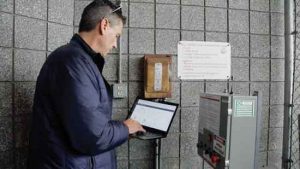A managed waste service provider brings a tailored approach to waste and recycling management by offering services customized to fit every customers’ unique business needs. That level of personalization coupled with advanced technology and rich program data enable customers to save money and focus more time on business matters.
By Michael Hess

Photos courtesy of Waste Harmonics.
Today, the customer experience is more critical than ever before. This rings true across all industries. Technology is transforming the way we operate and communicate with one another—and the value that comes with every touchpoint with customers must reflect a customized approach.
Defining what value means and then delivering it is unique to each customer. It all comes down to the relationship you build with your customers right from the start—and how you continue to drive it over time. This will drive a strategy that is built on mutual trust by showcasing a deep understanding of your customers’ business, the ability to find opportunities to improve processes and deliver quantifiable results that make an impact.
Think of it this way: you are not just delivering products and solutions as a service on a pre-determined basis (ie., weekly, monthly, quarterly, etc.) and letting it run until you hear from the customer. Rather, you are going the extra mile to add a personal touch by ensuring customers’ expectations and goals are being met by consistently checking in and pinpointing ways to boost efficiencies, when applicable. Value as a service becomes the crux of the strategy.
While many customers may have similar business goals and challenges, their expectations and needs may differ significantly. And that is where the value you provide can set you apart from competitors. Conversations and collaboration are key elements to help redefine and differentiate the customer experience—and, ultimately, establish the most effective program and strategy for your customers.
Value in the Waste Industry
Every business has unique waste and recycling needs. A one-size-fits-all approach does not work in our industry. Luckily, there are a variety of vendors and programs available to help customers meet their unique business needs—no matter how specific the requirements. And for businesses that have many locations, there are many factors that need to be accounted for in a waste program—making the customer experience even more important. Enter a managed waste service provider (MWSP).
Providing a good customer experience goes beyond knowing your customers by name and offering occasional assistance. It is about thinking differently and providing expertise at a level that is personalized to each customer. Getting to know the inner workings of a customer’s business and their goals goes a long way and is key to fostering a long-term relationship over time. This is the heart of the approach of an MWSP.
Simply put, an MWSP is an extension of a business’s team, handling all things related to waste management. It simplifies the way a company handles waste management by being the central source for waste services across all locations.
All of this means that businesses have one point of contact and one invoice for all of their locations. This takes the burden off of internal personnel, allowing them to refocus their attention on other areas of the business.

MWSP Benefits
Beyond being a centralized source for waste management, below are some of the other benefits that an MWSP brings to the table:
1. Simplified disposal monitoring. For businesses with multiple locations locally and/or nationwide, there are many day-to-day actions and responsibilities that are necessary for owners to do to keep business running as usual. Waste management does not have to be one them.
An MWSP can step in to help coordinate and organize a waste program that is tailored to the specific needs of each customer. They work directly with vendors to identify the best waste and recycling options. Using a vendor bidding system, an MWSP can analyze a variety of competitive options to ensure that a company is getting the best rates and level of service. Additionally, they continually monitor for any adjustments that are needed as well as opportunities for cost savings.
2. One point of contact. Working with an MWSP means each customer has a dedicated customer service representative. Customers have a direct line of contact and do not have to wait on an automated telephone line. The rep works closely with key business personnel to report back on the program’s performance.
3. Advanced technology and analytics. Tracking, metrics and analytics are not just for sales goals. An MWSP can help set up a waste and recycling tracking system that can help share key data and insights about program performance.
Implementing a tracking system, typically via a cloud platform, allows customers to identify their current waste streams while determining how much waste they are generating. The system can measure things like waste receptacle fullness and the status of the whole power unit, including oil temperature, switching controls, safety features, container connections and system operating performance.
Data is golden in today’s technology-driven age and it is the driver of being better informed about waste throughput. Customers get detailed reports that provide insight into their waste management program including waste spend, ongoing program statistics and service insights.

4. Waste program analysis. An MWSP can be a critical partner in helping businesses measure and evaluate their waste and recycling flow overtime. If business grows over time, an MWSP can help right-size the program to meet new requirements. Or, if there are any seasonal fluctuations that will affect trash flow, they can also help adjust accordingly to ensure no overflow issues arise.
The goal of keeping a real-time handle on a waste program is to drive efficiencies up and the costs down. In doing so, there may be blatant areas that waste reduction can be achieved or opportunities to open additional waste and recycling programs.
5. Issue management. Every customer has a dedicated representative who will be able to investigate and solve any waste management issues. That representative will address the issue and report back to the customer on the solution.
A Tailored Approach
An MWSP brings a tailored approach to waste and recycling management by offering services customized to fit every customers’ unique business needs. Value is derived from the initial touch point with the customer and then driven through consistent touchpoints about program performance. That level of personalization coupled with advanced technology and rich program data enable customers to save money and focus more time on business matters. | WA
Michael Hess is founder and chief executive officer of Waste Harmonics, a Rochester, NY-based company that provides customized waste and recycling management solutions for businesses across North America. Michael leads Waste Harmonics’ team of waste/recycling, technology, logistics and customer service experts who managed waste and recycling services—which deliver significant costs savings—for single- and multi-location businesses in a wide range of business categories, including retail, grocery, restaurant, travel center, logistics, distribution and shipping. Prior to founding Waste Harmonics, he served as Vice President of U.S. operations for Capital Environmental Resource Inc., a $120 million in revenue solid waste collection and disposal company with operations in the Northeastern U.S. and Canada. During his tenure at Capital Environment, Hess served as an integral part in the acquisition, startup and integration of 11 solid waste companies for more than two and a half years. Michael acquired Waste Harmonics from Capital Environment in 2001 and has since grown the business from a solely Northeastern United States focus to serving customers throughout the U.S. and Canada. For more information, call (585) 924-9640, e-mail [email protected] or visit www.wasteharmonics.com.
